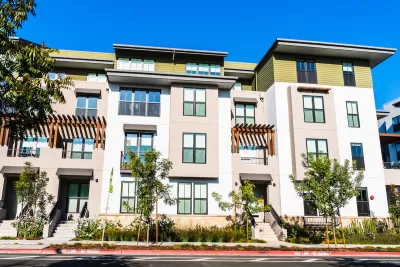The way apartment buildings are financed has a major impact on supply and costs.

In a piece for Strong Towns, Charles Marohn seeks clarity on the many rumors swirling about the U.S. housing market. “If we listen to those concerned about housing affordability, rents are already too high and may only go higher. If we listen to those concerned about housing finance, panic sits just under the surface because rents are about to collapse. Can both of these narratives be true?”
Marohn explains how the way that multifamily residential buildings are financed has a lot to do with rent costs and supply. “The way you make money in commercial real estate today is by leveraging lots of debt. This is one of the reasons that just 25 developers were responsible for one in four multifamily units started in 2022, an astounding level of concentration in a market with over 60,000 developers.”
Marohn notes that the current system of commercial debt worked for property owners and lenders for decades. Now, things are coming to a head. “There are many reasons why there is such hyperventilating over higher interest rates (I mean, we are ridiculously overindebted at all levels of society), but one enormous reason is that it forces the issue on commercial real estate. When the loan is rolled over, the numbers don’t work anymore.”
According to Marohn, it’s possible that lower interest rates made it easier for investors to withhold real, vacant apartment from the market to restrict supply and drive up rents. “If you think building more units in this same top-down, financialized system is going to fix things, you’re stuck in the housing trap. There’s only one way out: a bottom-up revolution in how we deliver lots of units at prices anchored to local capacity.”
FULL STORY: Are Rents About to Crash?

Maui's Vacation Rental Debate Turns Ugly
Verbal attacks, misinformation campaigns and fistfights plague a high-stakes debate to convert thousands of vacation rentals into long-term housing.

Planetizen Federal Action Tracker
A weekly monitor of how Trump’s orders and actions are impacting planners and planning in America.

In Urban Planning, AI Prompting Could be the New Design Thinking
Creativity has long been key to great urban design. What if we see AI as our new creative partner?

King County Supportive Housing Program Offers Hope for Unhoused Residents
The county is taking a ‘Housing First’ approach that prioritizes getting people into housing, then offering wraparound supportive services.

Researchers Use AI to Get Clearer Picture of US Housing
Analysts are using artificial intelligence to supercharge their research by allowing them to comb through data faster. Though these AI tools can be error prone, they save time and housing researchers are optimistic about the future.

Making Shared Micromobility More Inclusive
Cities and shared mobility system operators can do more to include people with disabilities in planning and operations, per a new report.
Urban Design for Planners 1: Software Tools
This six-course series explores essential urban design concepts using open source software and equips planners with the tools they need to participate fully in the urban design process.
Planning for Universal Design
Learn the tools for implementing Universal Design in planning regulations.
planning NEXT
Appalachian Highlands Housing Partners
Gallatin County Department of Planning & Community Development
Mpact (founded as Rail~Volution)
City of Camden Redevelopment Agency
City of Astoria
City of Portland
City of Laramie





























